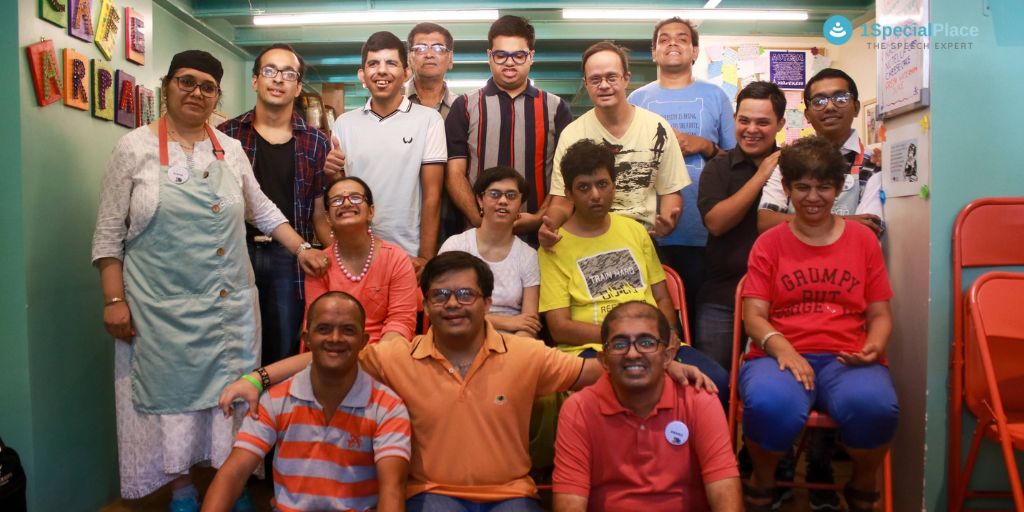
In Conversation with Café Arpan
In Conversation with Café Arpan
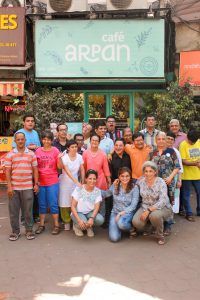
- Website: Yash Charitable Trust
- Facebook: Yash Charitable Trust
- Instagram: yashcharitabletrust
Yash Charitable Trust (YCT) is a Mumbai-based public charitable organization founded in 2014 by Dr. Sushama Nagarkar; its vision is that persons with developmental and Intellectual Disabilities (PwIDDs) like Autism, Downs’ syndrome, Cerebral Palsy, etc. will live and work in the community of their choice with dignity and self-respect.

Since its inception, YCT’s mission has been to enhance the quality of life of our beneficiaries (PwIDDs) through inclusive community-based activities which assist them in becoming more responsible and productive members of society.

We attempted to address the problem of livelihood primarily by training and offering supported employment at two of our flagship programs – Café Arpan and Arpan Food Services. These opportunities are inclusive in nature, create natural friendships and community involvement leading to an enhanced quality of life. Additionally, we also run weekly therapeutic enrichment activities and community-based initiatives.
Q. Share with us your journey of establishing “Café Arpan”?
Our first supported employment initiative was Arpan Dabba Service was set up in 2015. Over the next 3 years, the team expanded, the work-load grew but our physical space didn’t. As we could not accommodate more people who wanted to join, it was time to expand. While doing our research, we came across a heart-warming story of a family-based in the Philippines who started The Puzzle Café. They started it so that one of their adult children – a person with autism – has a place to work. The one thing missing with our Dabba service was customer interaction. We wanted our team members to engage face-to-face with their customers. And so the idea of Café Arpan was conceived.

We started by raising sufficient funds, reaching out to professional resources within our networks to help with the interiors, the menu, the branding, and training. It was challenging to find a suitable location but we were fortunate enough not just to find an ideal location but wonderful landlords who believed in our cause. The whole set-up took six months during which we procured all our necessary permits, set up a training schedule, and prepared to open doors to the first café in the city that only employs PwIDDs.
Café Arpan was inaugurated on August 2, 2018, and since then has matured and found a niche space within the F&B industry. It is an all-inclusive space open to anyone and everyone. We operate 6 days of the week, have a fun menu of quirky dishes and we guarantee a feel good-vibe as soon as you enter. Our hope is that others will feel inspired by our story and start their own supported employment enterprise within their own community.
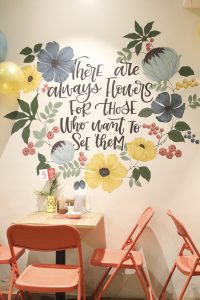
Q. What is a typical day at “Café Arpan”?
Café Arpan operates Tuesday to Sunday from 11 am to 8 pm. The team members (our PwIDDs), work in two shifts. The first shift is responsible for opening and setting up the café while the second shift takes on the role of closing for the day. Some of their daily tasks include – checking inventory, preparing the tables with certain fixed items (tissues, sugar sachets, water jug, etc.), prepping the vegetables and/or sauces required and some members even go to the bank to deposit the previous day’s earnings.

All of them follow our HR protocols, clock-in and out of our attendance system, have fixed responsibilities and job goals, and are accountable for their actions just like the rest of the working population.
Q. Who are the team members at “Café Arpan”?
The Café Arpan team comprises persons with developmental and intellectual disabilities (PwIDDs). Of the 32 beneficiaries we have at YCT, 18 adults (between the age group of 22 and 50) currently work at the café and back-end kitchen. In addition to our special team, we have a café manager and two support staff in the kitchen that helps run and manage the daily operations of the café.

Q. What are some of the training skills provided to your employees?
Before Café Arpan opened, we gave our team members a brief and fundamental training. Our team members were given job roles based on their preferences, abilities, and overall qualities. For example, my cousin Aarti and her friend Abuli are very social and love meeting and talking to people; they are assigned as greeters and servers; Aaron and Pratibha love to cook and follow recipes – they are now chefs at our kitchen and can prepare anything off the menu with minimal supervision.

We encouraged everyone to think of the café as their home and how they would welcome and treat any guest that visited. Our PwIDDS received practical training throughout Café Arpan’s first year of operation.. Subsequently, many more people came forward wanting to join YCT and the number of beneficiaries grew rapidly. Training on the job was no longer a viable option. YCT now has a curriculum that focuses on the hard skills required in the F&B space as well as a soft skills component that gears the adults to develop many of the skills required in a workplace: interpersonal communication, grooming, and personal hygiene, time management, developing personal responsibility, taking instructions from supervisors and so on.

Q. What has been the feedback of customers visiting “Café Arpan”?
Since Café Arpan was officially launched back in August 2018, we have been showered with positive feedback and overwhelming support. We officially went viral for the first few months! The team was ecstatic at being able to interact and serve every kind of customer that walked in.
The menu was simple but special – made with lots of love – food that’s good for the tummy but also the soul. More than anything else, customers loved the ambiance, the feel-good vibe and always complimented our team members for making everyone feel warm and special.

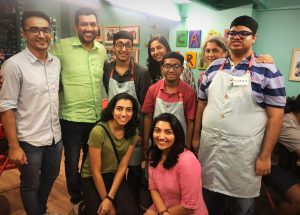
The lockdown and pandemic have definitely impacted our sales; however, the customers who are comfortable visiting are still overtly positive in their feedback and continue to embrace our efforts and whole-heartedly supporting our vision and mission. We hope that Cafe Arpan serves as an example of endless possibilities and perhaps one day inspires another family, individual, or group to start something in their own community.
Read our blog on Children with special needs here
Q. What are the future plans for “Café Arpan”?
When we first opened Café Arpan in 2018, we did not know how the community and city at large would respond. In the two years of running the café, we have proven that our model works – that PwIDDs can work in a supported environment with dignity and respect. With training, guidance, and support, we have seen the impact that our work has made on the lives of our beneficiaries, their families, and all our stakeholders. Running a food business in a competitive market like Mumbai will always be challenging. But we believe that our work is replicable.
In January 2020, we successfully launched Café Arpan @ Accenture Vikhroli – an exclusive café catering to the 1500 staff at the company’s head office. We hope to restart that cafe (once Covid goes away) and many more like that in the next few years so that we can generate continuous skilling and supported employment opportunities for PwIDDs.
Q. What was the biggest challenge in setting up “Café Arpan”?
As you can imagine, setting up anything new is hard. We started with our first crowd-funding campaign (on Impact Guru). It was challenging to find a suitable location because many shop owners did not want to rent to an NGO.The majority of the difficulties we encountered were external (obtaining various licences and clearances), yet they were handled gracefully and completely openly. Most people think that training our team members was difficult, but the reverse was true; because they were all about to begin their first official jobs in the real world, our team members stepped up to the plate like pros.
Q. What would you wish to tell other entrepreneurs?
Cafe Arpan was established with the sole purpose of being a safe and supported space for our team members to work and be included. Eateries like ours are just one example of what PwIDDs are capable of – all they need is the opportunity and support.
Persons with disabilities are an asset to our working population. For many PwIDDs, they thrive with routine and uniformity. So, we encourage potential employees to assign jobs that suit an individual’s skill set. We have been successful using this method at Café Arpan. It’s important to have an open mind, be passionate and see the potential in diversity.
Café Arpan will always work as a therapeutic space for everyone, for people who work there and for people who visit. Having access and being able to support businesses run by a differently-abled workforce, will be a wonderful start towards a more inclusive future. A country like India has the second largest population in the world, a country with such diversity will flourish with acceptance, empowerment, and inclusion. These three words form the pillars of what I believe should be the future of the disability sector.
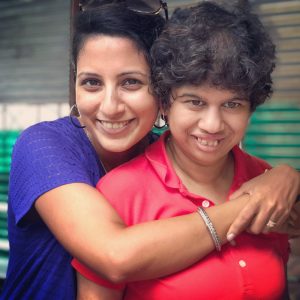
Recommend someone you know for the 1SpecialPlace wall of fame! Mail us at info@1specialplace.com
- Tele-Speech Remediation of Stuttering: A Case Study - April 22, 2023
- Voice Changes During Puberty in Teenagers - April 11, 2023
- Vital Stim Therapy for Swallowing Difficulty - April 4, 2023

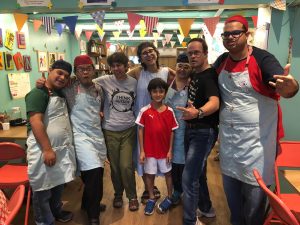
Leave a Comment
(0 Comments)